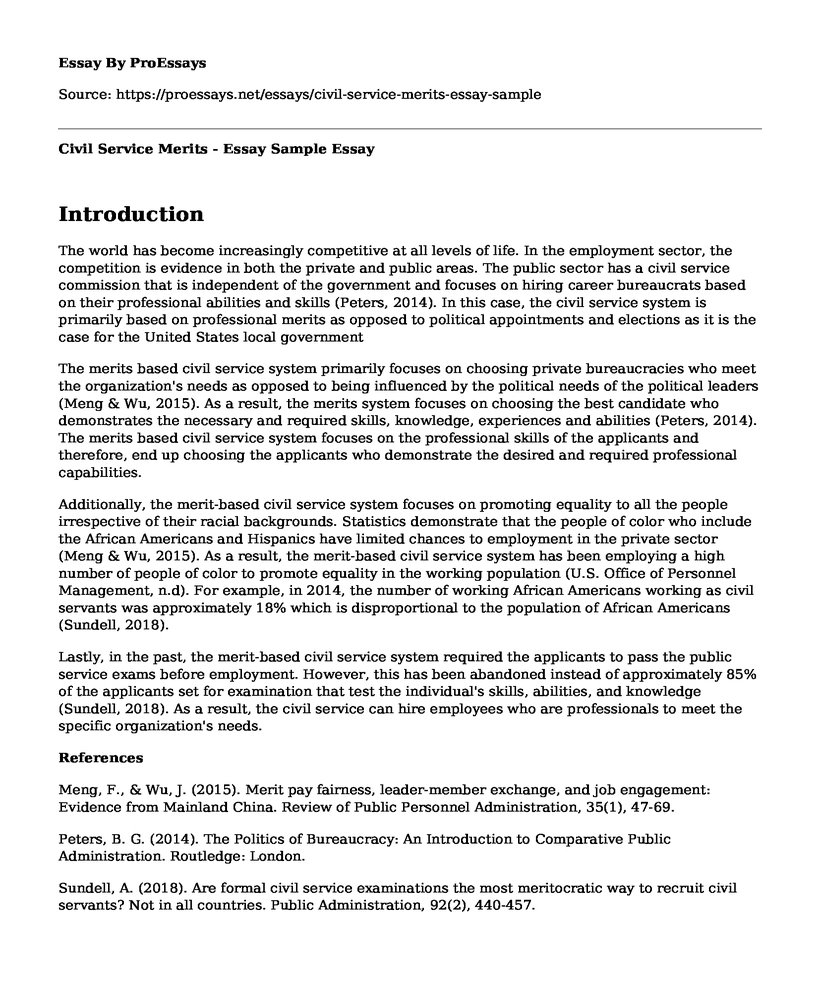Introduction
The world has become increasingly competitive at all levels of life. In the employment sector, the competition is evidence in both the private and public areas. The public sector has a civil service commission that is independent of the government and focuses on hiring career bureaucrats based on their professional abilities and skills (Peters, 2014). In this case, the civil service system is primarily based on professional merits as opposed to political appointments and elections as it is the case for the United States local government
The merits based civil service system primarily focuses on choosing private bureaucracies who meet the organization's needs as opposed to being influenced by the political needs of the political leaders (Meng & Wu, 2015). As a result, the merits system focuses on choosing the best candidate who demonstrates the necessary and required skills, knowledge, experiences and abilities (Peters, 2014). The merits based civil service system focuses on the professional skills of the applicants and therefore, end up choosing the applicants who demonstrate the desired and required professional capabilities.
Additionally, the merit-based civil service system focuses on promoting equality to all the people irrespective of their racial backgrounds. Statistics demonstrate that the people of color who include the African Americans and Hispanics have limited chances to employment in the private sector (Meng & Wu, 2015). As a result, the merit-based civil service system has been employing a high number of people of color to promote equality in the working population (U.S. Office of Personnel Management, n.d). For example, in 2014, the number of working African Americans working as civil servants was approximately 18% which is disproportional to the population of African Americans (Sundell, 2018).
Lastly, in the past, the merit-based civil service system required the applicants to pass the public service exams before employment. However, this has been abandoned instead of approximately 85% of the applicants set for examination that test the individual's skills, abilities, and knowledge (Sundell, 2018). As a result, the civil service can hire employees who are professionals to meet the specific organization's needs.
References
Meng, F., & Wu, J. (2015). Merit pay fairness, leader-member exchange, and job engagement: Evidence from Mainland China. Review of Public Personnel Administration, 35(1), 47-69.
Peters, B. G. (2014). The Politics of Bureaucracy: An Introduction to Comparative Public Administration. Routledge: London.
Sundell, A. (2018). Are formal civil service examinations the most meritocratic way to recruit civil servants? Not in all countries. Public Administration, 92(2), 440-457.
U.S. Office of Personnel Management, (n.d). Merit System Principles and Performance Management, Retrieved from https://www.opm.gov/policy-data-oversight/performance-management/reference-materials/more-topics/merit-system-principles-and-performance-management/
Cite this page
Civil Service Merits - Essay Sample. (2022, Dec 05). Retrieved from https://proessays.net/essays/civil-service-merits-essay-sample
If you are the original author of this essay and no longer wish to have it published on the ProEssays website, please click below to request its removal:
- Gender Diversity When Nominating Scientists
- Effective Communication in Nursing Essay Example
- Low Socioeconomic Status Compromises the Brain Development - Essay Sample
- Essay Sample on Charity Auction: Raising Funds & Awareness to Combat Domestic Violence
- Bussing Program Beneficial to Unrepresented Minorities: Rose Place Case Study
- Essay Example on Fairness & Equity in a Competitive Sphere: A Philosophical Conundrum
- Report Example on Remote Work Policies: Guidelines for Flexible Working







